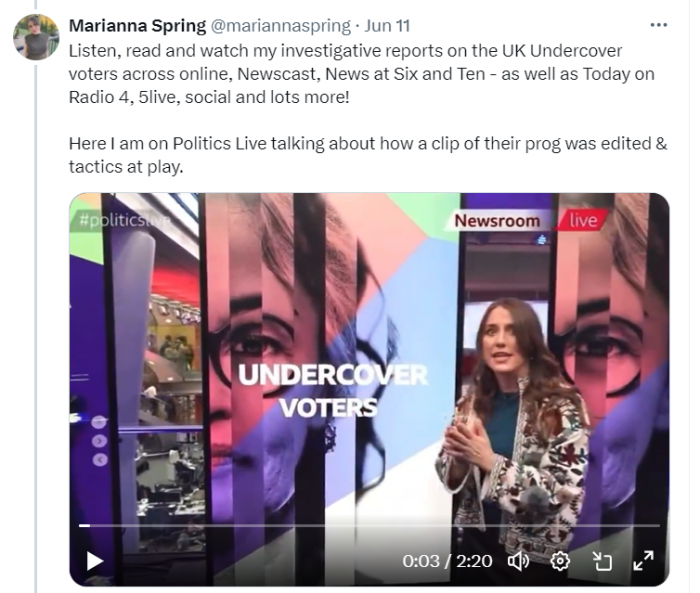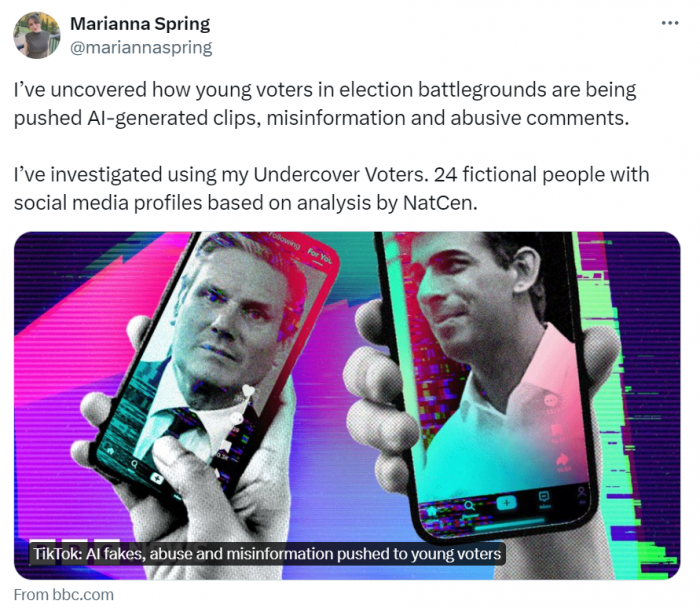Last week the BBC launched what it is calling its ‘undercover voters’ – 24 fictional characters it has created social media profiles for – with the aim of “getting visibility of the whole of social media” in the run-up to the general election in July.
At first glance, these characters sound rather like the social media avatars that Revealing Reality has pioneered the use of in research into people’s experiences online, initially in Pathways: How digital design puts children at risk and subsequently in other work, including a pilot study for Ofcom exploring the use of social media avatars in research. As a result of that work, the online regulator confirmed that “used carefully, and designed appropriately, these approaches could be valuable tools to use alongside our existing research and intelligence gathering”.
The BBC is emphasising that its fictional characters are based on research – using a new classification of British voters by the National Centre for Social Research. What we don’t know is how the corporation has turned these voter types into its undercover voters’ social media accounts.

NatCen has identified six “voter types”, which it says “move beyond the classic markers of left and right to create a more nuanced understanding of the dividing lines in British politics”, informed by the British Social Attitudes survey and other shared characteristics.
The 24 undercover voters “live” in eight different constituencies in the UK, selected by the BBC. NatCen says it advised the BBC “on which voter types would be more likely in each of the eight constituencies that the BBC selected” as well as “the likelihood of views and traits”.
But NatCen makes clear “the final views they hold, their demographic traits, their back stories and what they follow by social media are all journalistic decisions made by the BBC”.
How the BBC has taken NatCen’s voter ‘types’ – or the additional traits and back stories the corporation has overlaid – and translated their characteristics into what the fictional social media accounts follow, like, hover over, or otherwise engage with on social media remains unknown. And it is these decisions that determine what these profiles ‘see’.
The BBC’s disinformation and social media correspondent Marianna Spring has said the accounts are private and have no ‘friends’, and she has said she is using VPNs to “locate” the social media accounts in relevant geographical locations. But beyond this, we don’t know how she is, in her words, “feeding the algorithm”.
The BBC has published stories referring to what some of these fictional voters have been “shown”, “pushed”, “recommended” or “promoted” on “their” social media feeds. But there is a difference between what it is possible to see on social media and what people are actually being served.

What appears in these fictional characters’ feeds depends on how the accounts have been ‘seeded’ – what data has been put into the accounts and how they are interacting with content and other accounts. Without knowing this, it is impossible to assess – or even to understand – what the profiles reveal.
Even if you know details about someone’s life and likes, it’s not possible to guess how they will behave on social media. That’s why, at Revealing Reality, when we report what people are seeing and doing online using avatars, each avatar is based on research into what a real person is seeing or doing online. And it’s why we’d like to know how the BBC has worked out what to like, follow and engage with on its fictional voter accounts.
When we set up an avatar we base it on what a real research participant has told us they are seeing or doing online in a carefully designed, neutral, exploratory interview and/or what they’ve shown us (in person or using screen recordings). We share the full detail of the methodology, explaining both how the accounts are set up and how they are run afterwards. We also acknowledge their limitations – they are a proxy for real people’s experiences, they will never replicate them exactly. What they reveal is what’s possible.
It is legitimate and in the public interest for BBC journalists to report on political content online. And now that so much political campaigning is targeted digital messaging, it is useful for readers and viewers to be reminded that what they see on their own social media feeds is unique – and that other people will often see completely different content.
But presenting these accounts as representative of what voters are being shown and emphasising that they are based on research, without providing the full detail of how they have been set up and are being run, could give viewers the impression that the exercise is more rigorous and the results more representative of reality than is justified.
We have contacted Marianna Spring and some of the members of the BBC team she credits on X for the undercover voters work, asking for the detail of the methodology, but we have had no response. We have also asked via the BBC press office team, but they have replied saying they are too busy to provide further details.
